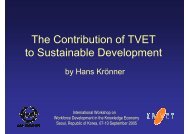Learning for Life, Work and the Future Initial ... - Unesco-Unevoc
Learning for Life, Work and the Future Initial ... - Unesco-Unevoc
Learning for Life, Work and the Future Initial ... - Unesco-Unevoc
Create successful ePaper yourself
Turn your PDF publications into a flip-book with our unique Google optimized e-Paper software.
Page 46 Participants’ Papers <strong>Learning</strong> <strong>for</strong> <strong>Life</strong>, <strong>Work</strong> <strong>and</strong> <strong>the</strong> <strong>Future</strong><br />
5. Summary<br />
The Malawi Government attaches great importance to<br />
education <strong>and</strong> training <strong>for</strong> employment. Consequently,<br />
<strong>the</strong> Ministry of Labour <strong>and</strong> Vocational Training is<br />
determined to fulfil its objectives through developing<br />
<strong>and</strong> ensuring an adequate supply of <strong>the</strong> skilled manpower<br />
necessary <strong>for</strong> national development through<br />
technical <strong>and</strong> vocational training <strong>and</strong> <strong>the</strong> provision of<br />
trades testing services. Whereas our past education<br />
planners were happy to educate clerks <strong>for</strong> employment<br />
in <strong>the</strong> public sector, among its broad objectives <strong>and</strong><br />
through TEVET, this Ministry is determined to promote<br />
an integrated, dem<strong>and</strong>-driven, competency-based<br />
modular technical education <strong>and</strong> training system.<br />
On <strong>the</strong> o<strong>the</strong>r h<strong>and</strong>, <strong>the</strong> Ministry of Labour <strong>and</strong><br />
Vocational Training underst<strong>and</strong>s that human resource<br />
development <strong>and</strong> training benefits individual men <strong>and</strong><br />
women by developing <strong>and</strong> maintaining <strong>the</strong>ir employability<br />
<strong>and</strong> adaptability in labour markets that change<br />
continuously under <strong>the</strong> influence of globalization,<br />
technological change <strong>and</strong> new ways of organizing<br />
work. While education <strong>and</strong> initial training provide <strong>the</strong><br />
fundamental employability requirements of individuals,<br />
continuous training <strong>and</strong> lifelong learning give<br />
<strong>the</strong>m <strong>the</strong> means to maintain it over <strong>the</strong>ir working lives.<br />
Human resource development <strong>and</strong> training improves<br />
<strong>the</strong>ir prospects of finding <strong>and</strong> retaining a job; it<br />
improves <strong>the</strong>ir productivity at work, <strong>the</strong>ir incomeearning<br />
capacity <strong>and</strong> <strong>the</strong>ir living st<strong>and</strong>ards; <strong>and</strong> it<br />
widens <strong>the</strong>ir career choices <strong>and</strong> opportunities. By<br />
developing <strong>the</strong> capabilities of workers to pursue collective<br />
<strong>and</strong> individual interests, education <strong>and</strong> training<br />
foster an environment that is conducive to economic<br />
<strong>and</strong> political democracy. They are tools <strong>for</strong> developing<br />
<strong>the</strong> new social skills, competencies <strong>and</strong> attitudes, <strong>and</strong><br />
<strong>the</strong> tolerance <strong>and</strong> solidarity needed <strong>for</strong> economic,<br />
social <strong>and</strong> political participation in an increasing integrated<br />
<strong>and</strong> mobile world. Finally, education <strong>and</strong><br />
training are indispensable to enable individuals to<br />
thrive in a society driven by knowledge, communications<br />
<strong>and</strong> technology.<br />
7 KAMANGA, Andrew Bonani (Botswana): Youth Unemployment<br />
1. Introduction<br />
Youth unemployment is an area of great concern to<br />
many governments in <strong>the</strong> Sou<strong>the</strong>rn African Development<br />
Community (SADC). The rates of economic<br />
growth in <strong>the</strong> respective countries are not sustainable<br />
enough to match <strong>the</strong> ever-increasing numbers of young<br />
people graduating from <strong>the</strong> high schools, technical <strong>and</strong><br />
vocational colleges.<br />
There is <strong>the</strong>re<strong>for</strong>e <strong>the</strong> need <strong>for</strong> a wide range of technical<br />
<strong>and</strong> vocational educational training with a greater<br />
focus on self-employment, entrepreneurship <strong>and</strong><br />
exploration of potential new sectors of employment.<br />
There have not been any reliable statistics published on<br />
<strong>the</strong> unemployment situation within SADC. However,<br />
it is generally accepted that <strong>the</strong>re is chronic youth<br />
unemployment in all <strong>the</strong> SADC member states, with all<br />
<strong>the</strong> psychosocial <strong>and</strong> economic consequences that this<br />
entails.<br />
2. Limited Job Opportunities in <strong>the</strong> In<strong>for</strong>mal<br />
Sector<br />
Due to <strong>the</strong> increasing calls <strong>for</strong> reduction in public<br />
sector expenditure by many governments, employment<br />
in this area is becoming more precarious than ever.<br />
The situation in <strong>the</strong> subregion is fur<strong>the</strong>r compounded<br />
by <strong>the</strong> fact that <strong>the</strong>re is very little <strong>for</strong>eign direct investment<br />
(FDI) to kick-start o<strong>the</strong>r economic activities that<br />
generate employment in <strong>the</strong> <strong>for</strong>mal sector <strong>for</strong> both<br />
public <strong>and</strong> private set-ups.<br />
The sport, recreation, leisure <strong>and</strong> fitness industry has<br />
become a multi-billion dollar business all over <strong>the</strong><br />
world, generating millions of jobs in both <strong>the</strong> <strong>for</strong>mal<br />
<strong>and</strong> non-<strong>for</strong>mal sector.<br />
Despite great potential in Africa as a whole, <strong>and</strong><br />
particularly in <strong>the</strong> sou<strong>the</strong>rn Africa region, <strong>the</strong>re are<br />
very few benefits accruing to <strong>the</strong> young people of <strong>the</strong><br />
region in this lucrative sector.<br />
There is need <strong>for</strong> a comprehensive technical <strong>and</strong><br />
vocational education programme to address <strong>the</strong> chronic<br />
shortage of skilled personnel in <strong>the</strong> delivery of sport,<br />
recreation, leisure <strong>and</strong> fitness services.<br />
At present, sport education <strong>and</strong> training programmes<br />
are haphazard. They are left to <strong>the</strong> discretion of <strong>the</strong><br />
relevant national sports associations. There is no<br />
st<strong>and</strong>ardization of sport coaching <strong>and</strong> administration<br />
training.<br />
There are some physical education <strong>and</strong> sport programmes<br />
at various colleges, universities <strong>and</strong> technikons<br />
(especially in South Africa). These are usually<br />
tailor-made <strong>for</strong> producing graduates <strong>for</strong> schools <strong>and</strong><br />
sports associations. The unavailability of Institutes of<br />
Sport or Sports Academies means that professionalisation<br />
<strong>and</strong> career development is affected. In some<br />
cases, interested individuals have to go abroad <strong>for</strong><br />
training in specialized areas.





